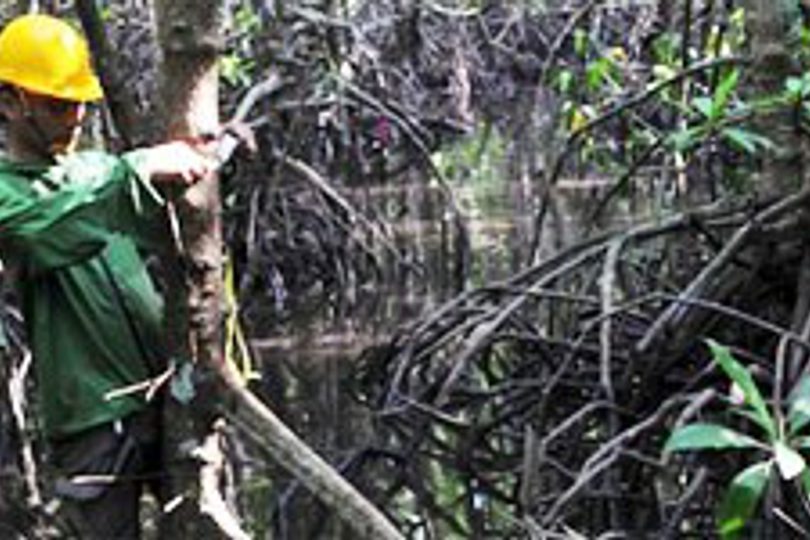
Forests are high on the political agenda at the moment as people recognize the value of forests for maintaining livelihoods and ecosystems. The Center for International Forestry Research (CIFOR) aims to ensure that decisions that influence forests and the people who depend on them are based on the principles of good governance and robust science.
Professor Peter Kanowski, Deputy DG of CIFOR, speaking at the Oxford Centre for Tropical Forests Seminar Series on “CIFOR & the global forests and forestry agenda” talked about a new initiative that involves the Oxford Biodiversity Institute and builds on work carried out in the Department of Plant Sciences over the last six years. The initiative is part of a CIFOR drive to improve the quality, relevance and impact of their impressive research programmes that seek to find ways of sustainably managing landscapes against a backdrop of some of the most pressing problems of the 21st century: poverty, food security and health inequalities.
There are increasing expectations that policies should be ‘evidence based’. Scientific research is clearly an important source of evidence that informs policy, although, of course, it rarely provides answers to policy issues, nor is it the only source of what counts as evidence for policy. And it is messy and contested, which makes it difficult to use by decision-makers who may lack subject expertise, access to the full range of relevant publications and time to read closely-argued texts and understand detailed graphs, with or without error bars of baffling length. The huge volume of research that emerges each year in forest-related topics makes the body of knowledge ripe for cherry-picking by those with agendas to push and silos to protect. As former visiting scholar at the Institute for Science, Innovation and Society (InSIS), Roger Pielke Jr., observes:
“The scientific enterprise is diverse enough to offer information that can be used to support a diversity of perspectives on just about any subject…deciding a course of action and then finding information to support it is common across the political spectrum”
With these challenges in mind, CIFOR took the step of introducing an ‘evidence-based forestry’ initiative and invited me to work with them to develop the programme. The programme at CIFOR will draw on Oxford’s twenty years’ experience in developing and practising evidence-based medicine at the Cochrane Collaboration and the Centre for Evidence Based Medicine. In particular, the CIFOR initiative will focus on the production of a series of systematic reviews of evidence to help unpick some of the current scientific narratives which dominate international forestry discussions.
Elements of a systematic review, adapted from Petrokofsky et al. 2011 and reproduced by kind permission of the Commonwealth Forestry Association

Systematic reviews are at the heart of existing evidence-based initiatives not only in healthcare, but also in social welfare (Campbell Collaboration) and environmental conservation (Collaboration for Environmental Evidence), but they are largely unknown in the field of forestry. They are powerful information tools that aid good decision-making and are designed to handle large numbers of studies without introducing additional biases. Terms like ‘evidence-based policy’ are used freely in international and national policy briefings in forestry, but these are largely without clear definitions of what evidence has been selected and on what basis it has been analysed.
CIFOR was established twenty years ago as an ‘institute without walls’ and the systematic review framework exactly matches this approach. CIFOR, in association with the Biodiversity Institute, and with generous funding from the UK’s Department for International Development (DFID) will hope to establish a ‘collaboration without walls’ with partner organisations who share the desire to strengthen the international development community's capacity for evidence-informed decision making by the production and dissemination of systematic reviews.
- More about Gillian Petrokofsky and her work at the Biodiversity Institute.
- Pielke, R.Jr. 2007. The Honest Broker: Making Sense of Science in Policy and Politics. Cambridge University Press.
- Read the paper Petrokofsky G., Holmgren P., Brown N.D., 2011. Reliable forest carbon monitoring: systematic reviews as a tool for validating the knowledge base. International Forestry Review 13(1):56-66.
- DFID, 2012. Systematic Reviews in International Development: An Initiative to Strengthen Evidence-Informed Policy Making.
Picture shows CIFOR PhD student Jodie Hartill (reproduced by kind permission of CIFOR). A version of this blog, co-authored by Gillian, was published on the CIFOR blog on Feb 7th, 2013.
This opinion piece reflects the views of the author, and does not necessarily reflect the position of the Oxford Martin School or the University of Oxford. Any errors or omissions are those of the author.
